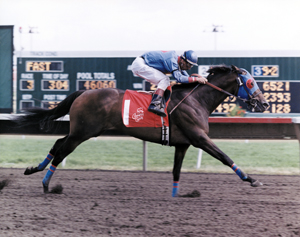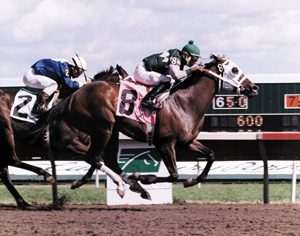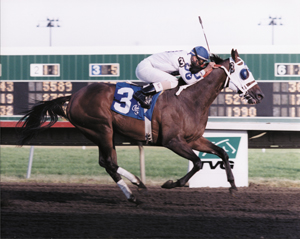by David M. Miller
If you ever thumbed through a condition book looking for the right “spot” to run your horse, the appeal of the Claiming Crown is obvious: Seven races, $560,000 in purse money and every runner on the card has started for a tag at least twice in the last year. Though its concept was easy enough to embrace, the difficulty in bringing all the elements together to ensure the Claiming Crown’s long term success has required the sacrifice of horsemen and racing organizations alike.
While the first running of the Claiming Crown created a precedent, its organizers knew full well it would take even greater support, organization and resources to permanently establish the event. When the dust settled on August 6, those who witnessed Claiming Crown II came away with knowledge that a new tradition for the claiming horse and its connections had been forged.
The idea of a championship day of racing for the claiming horse first originated with former Thoroughbred Owners and Breeders Association head Drew Couto, who had proposed the concept as part of a revitalization of the Birmingham Racecourse. Couto was contacted by Canterbury Park President and General Manager Randy Sampson, who expressed an interest in hosting the event. In the talks that followed, the concept of the Claiming Crown was created.
The event found a powerful ally in the National HBPA, which became a co-sponsor of the Claiming Crown. After months of hectic planning, the first Claiming Crown Championship was held at Canterbury Park August 7, 1999. The six race Claiming Crown card was judged a success by observers who witnessed the event at Canterbury Park and at simulcast sites around the country. Despite a purse shortfall that was created in part by an overestimation of the number of nominations, Claiming Crown organizers were pleased with the results of the inaugural running of the event.
As part of its agreement in helping create the Claiming Crown, Canterbury Park had secured the rights to host the event in its first three runnings and six times in its first ten renewals. Plans for the second running included changes in the Claiming Crown nominations process and the number and type of races to be offered. The most significant change to the race card was the turf conversion of the Tiara, the $100,000 event for fillies and mares. A seventh race, dubbed the Emerald, was then added for colts and geldings at a mile and a sixteenth on the turf.
In an effort to encourage trainers to nominate their charges, the Claiming Crown introduced a split nominations process whereby a horse could be named at the time of nomination for $100 or an “Open” nomination–omitting the name of the horse–could be made for $250. The first round of nominations utilizing the $100/$250 split fees closed on May 1. From May 2 until June 19, Claiming Crown nominations could be made for $500 and required that the trainer name the horse so nominated. June 19 was also the deadline for naming horses which were previously nominated during the “Open” nominations period. After June 19 and until July 18, horses could be supplemented to the Claiming Crown for 5% of the guaranteed purse of each race. Two-hundred and thirty-three nominations, including six supplemental entries, were made for Claiming Crown II.
A number of racing associations sponsored Claiming Crown “Preview” days, where runners who were aimed for the Claiming Crown had a chance to compete on a local level prior to shipping to Canterbury Park. On June 10, Philadelphia Park hosted its Claiming Crown Preview Day, which was highlighted with the $50,000 Jewel Stakes on a card that featured over $200,000 for Claiming Crown runners. In addition, Philadelphia Park offered to pay nomination and shipping fees for any runner who won a race on Preview Day.
The concept of regional Preview Days has dovetailed with the development of a “Team” approach to each region’s representation in the Claiming Crown. In this year’s event, teams representing Arizona, Florida, Kentucky, Pennsylvania and Texas regions each made their way to Canterbury Park. In the years ahead, the Claiming Crown could be strengthened through the continued evolution of regional Preview Days, with runners advancing to the national stage after proving their merits against the best local competition.
Horses that were nominated to the Claiming Crown were required to be pre-entered on July 21. This year, every runner pre-entered for the event qualified for its respective race on Claiming Crown Day. In the event a race is oversubscribed in the future, runners will be elected according to points accrued in the previous year’s racing. This should ensure that the most accomplished runners qualify for a position in each Claiming Crown race.
Following a post position draw breakfast and a Claiming Crown eve party sponsored by Canterbury Park, the day the participants all awaited had arrived. Though a bit overcast in the morning, the rain held off and the second running of the Claiming Crown was held under partly cloudy skies and temperatures in the high seventies. While the track had been worked extensively in the weeks prior to the Claiming Crown, horsemen were greeted with a surface that appeared to play fast yet fair for all types of runners.
The Iron Horse

The first race of the Claiming Crown card featured a field of nine starters that had each previously started for a $5,000 claiming price, but the fans betting on the race could see their way to only one. Odds-on Gingerboy did not disappoint as he galloped to a seven-length win under Mark Guidry in the mile and a sixteenth, $50,000 Iron Horse. Campaigned by Minnesota native Robert Lothenbach and trained by Chicago-based David Wood, Gingerboy vindicated his connections’ efforts in the Claiming Crown. In its first running, the Lothenbach stable had not managed to win a Claiming Crown race despite nominating nine runners.
Prairie Meadows shipper Irish Bacon finished second, better than four lengths clear of locally based Your Draw who ran third. In a year that saw the honest Gingerboy win seven of his eight starts, the win in the Claiming Crown netted the six year old Hansel gelding another $27,500 to bring his 2000 earnings total to over $110,000.
The Express

The $50,000 six-furlong Express drew a field of ten runners that had each started for $7,500 twice in the previous year. Programable was favored after winning the Claiming Crown Express Preview at Philadelphia Park in June, but it was another Philly shipper who captured the race when Spit Polish, carrying the colors of Richard Englander, drew clear of his rivals late to win by two and a half lengths under jockey Jose Flores. Locally based Modesto, a supplementary nominee to the Claiming Crown, rallied in the lane to best Citizen’s Arrest for second by a neck. Favored Programable ran fifth after suffering a rough break.
Spit Polish was trained by Scott Lake, who was en route to his biggest day as a thoroughbred trainer. Spit Polish’s connections haltered the winner at Philadelphia Park in May for $10,000. He earned $27,500 for his win in the Express. The son of High Brite was bred in Kentucky.
The Glass Slipper

Ten fillies and mares that had each started for $12,500 were entered in the $60,000 Glass Slipper. Strumming, a filly that had won four of her six starts on the year, was made the 2-to-5 favorite on the strength of a gaudy 12-length win against starter allowance company at Ellis Park in July. Her form was not confirmed in the Glass Slipper, however, as the Englander colors were again carried first to the wire when A Lot of Mary, under jockey Flores, edged 30-to-1 longshot Pretty Lily by three parts of a length. Locally based Cinderella Island finished well to notch third, another six and three quarter lengths behind the top pair.
The Scott Lake trained winner had only started once since April, when she captured a $10,000 claiming event at Philadelphia Park in the first week of July. A Lot of Mary’s last win prior to her victory in Philadelphia had come against allowance company in March at Charles Town. The winner, a Maryland-bred daughter of Clever Champ, earned $33,000 for her win in the Glass Slipper.
The Rapid Transit

Not everything went Scott Lake’s way on the Claiming Crown II card. In the $75,000 Rapid Transit for $16,000 claimers, McCarty Racing’s Bion was favored off his two good wins at Philadelphia Park, including a win in the Preview Day Rapid Transit. A former Minnesota-based runner, the six year old gelding was returning to Canterbury for the first time in two years, and his every stride save his last appeared a winning effort, when he was collared by the late running Teddy Boy on the wire. Arlington shipper Taylor’s Day made some late progress to be third, another length and a quarter behind the top pair.
The winner, a five year old by Cox’s Ridge, had been claimed by trainer Mike Goodin for $12,500 in May at Hollywood Park. Never out of the money in three subsequent starts against high priced claimers on the turf, the trainer and owner David Heller opted to ship Teddy Boy to the Claiming Crown, where he was partnered by Mark Guidry. Teddy Boy earned $41,250 for his victory in the Rapid Transit.
The Tiara

While form had held up for the first four races on the card, it appeared to take a back seat to the chances of a dreamy longshot when locally based Look to the Day snared the $100,000 Tiara for $20,000 fillies and mares. Under Canterbury-based Paul Nolan, the six year old mare got a rail skimming trip to the lane, then gamely fought between rivals to best Prairie Meadows shipper Vengeful Val by a nose. Pacesetting Pine Baroness finished a length and half further behind to be third.
The winner is campaigned by owner-trainer Charles B. Kelling, a 71-year old Canterbury Park regular who still gallops his own stock in the mornings. Look to the Day’s $66.60 winning payoff proved something of an underlay when her race record was considered. The California-bred daughter of Captain James chose Claiming Crown II day to make her first visit to the winner’s circle in nearly two years and earned $55,000 for her efforts. Favored Awasarumor never seriously threatened while finishing fifth, getting an outside trip on a turf course that appeared to favored runners with an inside placing.
The Emerald

With the rails set 30 feet out in the week prior to Claiming Crown II, the Canterbury Park track maintenance crew had taken special care in preparing the turf course for the event. Extensively watered in the days leading up to the Claiming Crown, the turf course had regained some its early summer luster and runners racing along the rail appeared to bounce over the surface.
The surface preparations shouldn’t force any premature conclusions about the winning form of the $100,000 Emerald victor P. D. Lucky, who had won four of twelve starts on the grass prior to shipping to Canterbury Park from his Florida base. In the mile and a sixteenth turf race reserved for $20,000 claimers, the front-running son of Lucky North had repelled a challenge from Shegardi (GB) to edge clear in the stretch and had plenty left in the tank to hold the late challenge of Felite Patet by a confident half length. G. R. Rabbit, who had just missed in the Philadelphia Park Preview Day Emerald, couldn’t improve on his good stalking trip and finished third, another half length behind Felite Patet. Public choices Alce Canadense and Take a Left (GB) could not make much impact with their late running styles.
The Emerald winner is trained by Manny Estevez for owner Donna Pettegrew. P. D. Lucky’s triumph under locally based Ramon B. Perez was the fifth win from eleven starts for the five year old Florida-bred gelding, which earned $55,000 for his win in the Emerald.
The Jewel

A compact but accomplished field of seven was entered in the $125,000 Claiming Crown Jewel, including four runners that had garnered black type this year despite racing for $25,000 claiming tags twice since last July. Canterbury regulars had found a deserving local favorite in Tom Metzen and John Voss’ Shot of Gold, a former Bob Baffert trainee who had found his way to Canterbury Park and won three races during the summer meeting since being claimed for $50,000 in January at Santa Anita. Favored in the wagering was Arlington shipper Chicago Six, who came into the Jewel off a win in an overnight handicap and had previously beaten Illinois-bred company to win the Milwaukee Avenue Handicap. Perhaps a bit overlooked in the wagering was the Home Team Stables’ B Flat Major, who had captured the Jewel Preview at Philadelphia Park before finishing a non-threatening seventh in the E. W. Furey Memorial Stakes at Laurel.
Shot of Gold opened a clear advantage on his rivals early on in the mile and an eighth contest, but B Flat Major steadily cut into the pacesetter’s margin and drew abreast entering the upper stretch. Shot of Gold offered some resistance but couldn’t match terms with the winner in the final furlong, gradually giving way. Under steady urging from Rod Madrigal Jr., B Flat Major extended his margin to two and a half lengths at the wire, with Shot of Gold a clear second, another four and a quarter lengths in front of Snohomish Loot. Even money favorite Chicago Six lost all chance when he was forced to check when caught in tight on the first turn, losing several lengths to his rivals. He then made a mild recovery to finish fourth.
The winner is trained by Scott Lake and brought the youthful conditioner his third win on the Claiming Crown II card. Claimed last September for $18,000 at Philadelphia Park, B Flat Major had been laid off for nearly eight months when he returned to win his first start of the year in an allowance race in May at Philadelphia Park. The winner, a six-year-old Pennsylvania-bred gelded son of Private Terms, earned $68,750 for his win in the Jewel.
A Marketable Event
What makes the Claiming Crown such an attractive prospect for future host tracks is the remarkable effect it has had on the live racing fans. Canterbury Park is located in the Minneapolis-St. Paul metropolitan area, and track officials reported live attendance of 13,922, more than 2,000 more than the number who witnessed the inaugural Claiming Crown. Part of that increase in attendance must be attributed to the NTRA’s cross promotion of the “Mystery Mutuel Voucher,” wherein mutuel tickets were mailed to over 50,000 Twin Cities households.
On-track handle for Claiming Crown II also surpassed the record levels set in 1999, with $999,719 wagered at the Shakopee track, representing an increase of over 16% from the previous year. Track President Randy Sampson and his staff augmented his track’s daily operations by pulling together a number of former Canterbury employees to help service the large crowd. The combined effect brought about an air of success not seen at the track since the days of its inception.
Despite some setbacks this year, the Claiming Crown concept is making inroads with the larger fan base of the simulcast market. Overall wagering on the Claiming Crown II card totaled $2,460,775, a modest increase from the $2,229,815 wagered from all sources on the inaugural Claiming Crown in 1999. Despite the fact that past performance information was not prominently featured in the West Coast editions of Daily Racing Form, wagering from the California hub led all sources of simulcast wagering with $515,350 wagered. Simulcast wagering from the Arlington International and New Jersey hubs each totaled over $100,000.
Perhaps the most disappointing aspect of the day’s events was the last minute failure to secure simulcasting of Claiming Crown II by a consortium of thirteen Mid-Atlantic wagering outlets. Fans familiar with the success of Scott Lake at Philadelphia Park were able to watch, but not wager, on his three winners, which returned $15.00, $15.00 and $13.40, respectively. With over $100,000 wagered on the Claiming Crown by the Mid-Atlantic outlets last year, combined with the increased participation of a number of Eastern-based connections, conservative estimates place the loss in handle at well over $100,000.
One market that improved its handle in wagering on Claiming Crown was Kentucky, where the signal was not offered at Churchill Downs or its Sports Spectrum in 1999. The $53,500 wagered this year represented a $50,000 increase from 1999 handle reports from that market.
A Neutral Site
The Claiming Crown has found a fair and neutral site in its selection of Canterbury Park as the initial host of its event. The winners on the Claiming Crown II card came from Illinois, Pennsylvania, California, Florida, Maryland and Minnesota. Perhaps the largest drawback in Canterbury Park’s hosting of the Claiming Crown is the track’s proximity to other racing circuits, a distance which may have limited the number of nominations to this year’s event.
While a Tex Sutton flight carried a number of the Eastern competitors to Canterbury Park, the connections of winner Teddy Boy and Take a Left (GB) could not afford to charter similar accommodations as they were the only California shippers who participated in Claiming Crown II. Those two runners journeyed to Canterbury aboard a regularly scheduled flight via Federal Express.
Planning for the Future
While the solid foundation of the Claiming Crown has been established, the program can be improved with increased participation from HBPA members in the nominations process. Certainly the most heartening development was the strong Preview Day program held by Philadelphia Park. The merit of the competition found in those prep races was demonstrated in a number of winning performances at Claiming Crown II. For its part, Canterbury Park is extremely pleased with the development of the Claiming Crown. “We’re thrilled” commented Director of Live Racing Operations Nat Wess, who also spearheaded Canterbury Park’s coordination with the Claiming Crown. “It certainly was a success,” echoed Randy Sampson “We’re happy with the way everything went. I’m kind of amazed even though the crowd was bigger than last year, we were well prepared and everything was positive. It was a super day.”
That sentiment was echoed by trainer Scott Lake, the unofficial “King of the Claiming Crown” who commented “I’ll be back again…With more horses.”
© 2000 The Horsemen’s Journal
